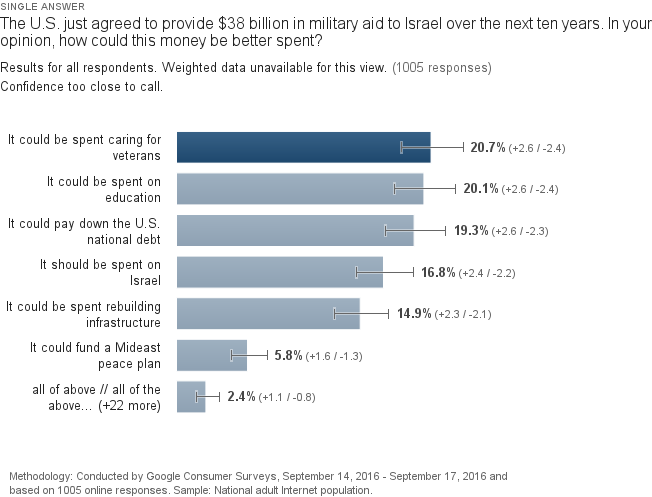Originally published at MintPress News.
AUSTIN, Texas — The announcement of a massive new aid package recently offered to Israel isn’t sitting well with many Americans, who would rather see the money used domestically, according to a new online poll.
On Sept. 14, the White House announced a Memorandum of Understanding under which the United States will provide Israel with an unprecedented $38 billion in “security assistance” over a ten-year period, between fiscal years 2019 and 2028. At about $3.8 billion annually, the deal marks a significant increase from the current levels of foreign aid to Israel, which total more than $3.1 billion each year.
“The majority of the proposed spending is for Foreign Military Financing to provide Israel advanced and upgraded jet fighters, to continue developing Israel’s missile defense systems and to purchase other U.S. weapons,” Grant Smith on Tuesday, director of the Institute For Research: Middle Eastern Policy, wrote in an analysis published by Antiwar.com on Tuesday.
A poll conducted by Google Consumer surveys posed this question about the newly minted deal to 1,005 internet users:
The U.S. just agreed to provide $38 billion in military aid to Israel over the next ten years. In your opinion, how could this money be better spent?
Just 16.8 percent of those surveyed thought the money should be spent on Israel. The majority, or about 81 percent, indicated that the money should be redirected elsewhere, with 20.7 percent suggesting directing the funds toward veterans, 20.1 percent toward education, 19.3 toward efforts to pay down the national debt, and 14.9 percent toward rebuilding U.S. infrastructure. A small group, 5.8 percent, wanted to see the funds go toward the Middle East peace process.

Google Consumer Surveys typically appear to website visitors, who are asked to answer a question in order to freely access content behind a paywall or on a website that generally operates on a subscription-only basis. While statisticians consideronline polling less effective than more traditional methods, Google’s results rated highly during the 2012 election season.
Regardless of methodology, last week’s poll isn’t the first to suggest Americans are uncomfortable with foreign aid Israel. In April, months prior to the latest deal, another Google Consumer Survey asked respondents to rate the amount of aid Israel receives. In that survey, 62 percent said they believe Israel gets too much aid.
A phone-based poll carried out in May by Shibley Telhami, a nonresident senior fellow at the Brookings Institution, suggested Americans are divided along party lines when it comes to foreign aid to Israel. According to Telhami’s poll, carried out with assistance from pollsters at Nielsen Scarborough, 57 percent of Democrats and 59 percent of independents think Israel gets “too much” or “way too much” aid. Republicans, however, were split more evenly, with 40 percent saying they believe Israel gets “too much” or “way too much” aid and 40 percent believing the country gets “too little” or “way too little.” By contrast, only 5 percent of Democrats and 17 percent of independents agreed that Israel receives “too little” or “way too little” aid.
Meanwhile, Grant Smith, director of the Institute for Research: Middle East Policy, has argued that in asking whether foreign aid to Israel is popular among Americans, polls may be overlooking the more important question of whether it is legal. On Aug. 8, Smith filed a lawsuit alleging that aid to Israel violates two amendments to the 1961 Foreign Assistance Act which forbid the U.S. from providing military aid to clandestine nuclear states.
In the lawsuit, Smith writes:
This lawsuit is not about foreign policy. It is about the rule of law, presidential power, the structural limits of the U.S. Constitution, and the right of the public to understand the functions of government and informed petition of the government for redress.
